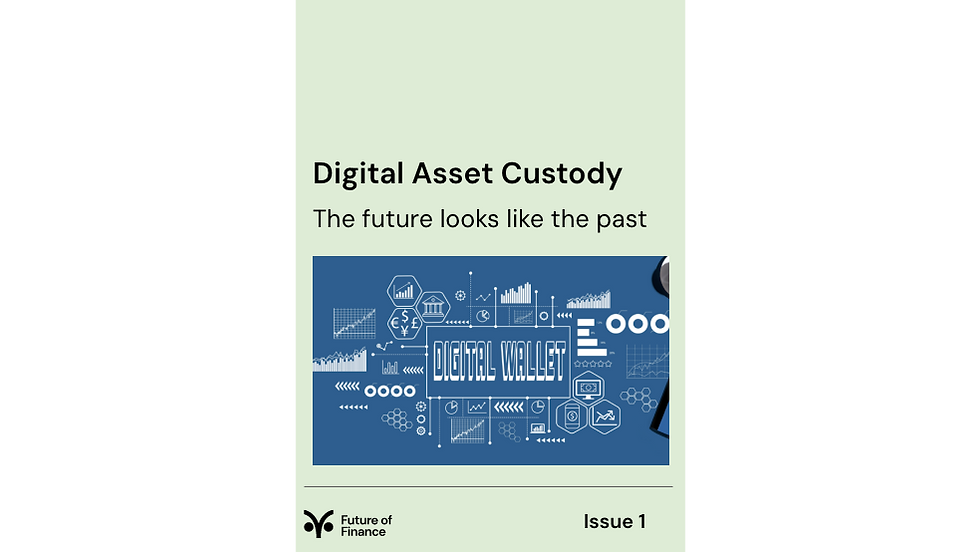Banks enter the digital asset custody market
- Jul 21, 2023
- 3 min read

Naturally, security and stability are found most easily in the traditional banking sector, and bank-owned custodians are accelerating the development of digital asset custody services to satisfy asset managers’ demands. Future of Finance research has so far identified 43 banks or bank subsidiaries offering digital asset custody services, including several Systemically Important Financial Institutions (SIFIs).
Table 1

The number of digital asset custodians in the Future of Finance database grew from 88 in 2022 to 102 in 2023, a sizeable increase despite the withdrawal of 13 firms from the marketplace. The new entrants were mainly banks as Table 1 makes clear.
This marks a change of strategy by banks, which spurned repeated efforts to develop cryptocurrency custody services from at least 2016, even as major asset and wealth managers invested in cryptocurrencies.
The reluctance of the banks to get involved is understandable. Even at their near-US$3 trillion peak, the cryptocurrency markets were tiny by comparison with the assets under management (AuM) of the ten largest global asset managers and the AuC of the ten largest global custodians of traditional securities(see Table 2).

What has changed for the banks?
The main reasons are:
a) The oldest of all: enough customers are saying they want some type of crypto exposure that it they need to be accommodated and the technology is fairly easily insourced. For many of these customer handling Bitcoin and Ether is enough to build a business (they are 75% of the crypto market).
b) The much, much bigger reason is the belief that DLT based Tokenisation is the future:
Firstly, for assets – stocks, bonds and a whole host of real asset types (Real Estate is the giant) and forms of finance (Trade Finance is the biggest target)
Second is the growing certainty that the future of money is tokenised. This got a huge boost with the now dead Libra project but there seems little doubt that there will be CBDCs in most major markets along with a host of regulated Stablecoins and Tokenised deposits.
Money is a bank’s most core activity and it’s going to run on DLT rails. Banks will have to spend massively to build digital asset infrastructure : digital asset custody is really just a part of that.
Enabling asset management clients to invest in the major cryptocurrencies, such as Bitcoin and Ether, provides custodian banks with valuable experience of how to safekeep digital assets. The investment is not large, because the technology necessary can be insourced.
Institutional interest in cryptocurrencies is likely to rise, but it is never going to be high. Though cryptocurrency evangelists point constantly to “institutional” engagement with cryptocurrencies, the truth is that their definition of “institutional” really refers to small groups of cryptocurrency-oriented hedge funds, wealth managers servicing high net worth individuals interested in cryptocurrency investing and family offices that do not have to answer to external investors. Bar a few genuine institutional investors such as Temasek, the Ontario Teachers’ Pension Plan, the Harvard and Yale endowments.
Recent applications by leading asset managers to register Bitcoin exchange-traded funds (ETFs) do not represent a reversal of this indifference. For example, Fidelity an ETF applicant, has a thriving digital asset trading facility and custody trust company with licenses from both the NYDFS and the FCA. Fidelity deals in precisely two cryptocurrencies: Bitcoin and Ether.
EDX, the cryptocurrency exchange founded by Fidelity in conjunction with Charles Schwab, Citadel Securities, Fidelity Digital Assets, Paradigm, Sequoia Capital, and Virtu Financial, will not deal in many more: Bitcoin, Ether, Litecoin and Bitcoin Cash.
In other words, the appetite of major global asset managers for cryptocurrency is narrow as well as small. It is the longer-term opportunity that matters to them – and therefore to the banks that service them.
Larry Fink, chief executive officer (CEO) of the largest global asset manager, has said as much. “I believe the next generation for markets, the next generation for securities, will be tokenisation of securities,” he told a 2022 conference. “Think about instantaneous settlement [of] bonds and stocks, no middlemen, we’re going to bring down fees even more dramatically.” (1)
In his annual letter to shareholders in the second quarter of 2023, Fink reiterated this point. “Tokenisation of asset classes offers the prospect of driving efficiencies in capital markets, shortening value chains, and improving cost and access for investors,” he wrote. “At BlackRock we continue to explore the digital assets ecosystem, especially areas most relevant to our clients such as permissioned blockchains and tokenisation of stocks and bonds.” (2)
